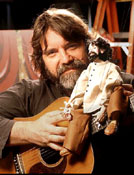




 |
 |
 |

What:
Darrell Scott
When:
Tuesday, Sept. 14, 9 p.m.
Where:
Barley’s
Cost:
$15
|
Give It Away
Darrell Scott’s songs prove their staying power
by Paige M. Travis
Darrell Scott is drawn to contradictions. He’s a grizzly bear of a man—with a sturdy frame topped with deep-set eyes, a thick beard and a wild mane of wavy half-curls. But for all the appearance of a backwoods militiaman, Scott lives in one of Nashville’s hippest neighborhoods, Hillsboro Village, a few easily traversed blocks of new restaurants, bars, coffee shops and businesses. After living in a house his father built on the outskirts of metropolitan Nashville for 11 years, Scott likes to be able to walk instead of drive.
That contradiction of appearance and reality is only on the surface, but it suggests further complications in easily gauging this artist. Scott’s approach to writing, recording and performing songs eventuates in ways that don’t necessarily connect with a straight line. The mind of an artist hardly needs to make complete sense; it just needs to work, and Scott’s got it down to a cleanly messy, perfectly imperfect science.
Most pop-country radio listeners haven’t heard of Darrell Scott, although they know his songs. Some of the biggest names in country music have recorded them: Dixie Chicks (“Long Time Gone,” “Heartbreak Town”), Garth Brooks (“When No One’s Around”), Travis Tritt (“Great Day to Be Alive”), Daryl Worley (“Family Tree”), Patty Loveless (“You’ll Never Leave Harlan Alive”) and Sara Evans (“Born to Fly”) have performed radio hits that likely deliver some pretty sweet royalty checks. Scott has two solo records on Sugar Hill, and most recently, Theatre of the Unheard, released on his new Full Light Records label. Theatre is a collection of songs that were intended to comprise his debut record in 1991. He had signed with SBK Records and recorded the songs with Guy Clark, Verlon Thompson and Bill Miller. But SBK shelved the project and those songs never saw the light of day.
The songs Scott recorded were the best he’d written up to that point as a twenty-something college student in Boston, and although they weren’t committed to compact disc, they weren’t forgotten. The best of the bunch, the ones that haunted him most, stayed in his live repertoire as he wrote others. He made Aloha From Nashville in 1997, Family Tree in 1999, and Real Time with Tim O’Brien in 2000—all full of impeccable songs. But that first batch tugged at him and found its way en total onto Theatre.
While his songs are immaculate constructions of rhyme and meter, his concerts are impromptu works of improvisation. He usually doesn’t even know the first song.
“I’m trying to be in the moment, not make a presentation from town to town,” he says. “I know how to do all that; I have all those muscles, but I don’t see the point in using them. I just get out there and do what I feel like doing. I like not having a plan.”
In the moments between songs, he’ll noodle on the guitar until the right next song becomes clear, giving the audience a break from lyrics, and, he admits, leaving him space to not have to talk. He acknowledges that audiences can also get bored with the requisite pattern of song, applause, banter, song, applause and so on. “Tonight’s performance is totally unique, and it won’t be echoed again tomorrow. There may be elements of it, but each night is its own.”
Scott’s fans will realize why these unreleased songs have stayed alive in his memory and in the occasional live show. They don’t sound like the early creations of a songwriter yet to reach his prime. They’re fully realized four- to five-minute short stories in the tradition of Guy Clark or Townes Van Zandt. Something of a change from his more spare folky production, Theatre gets a rich, diverse treatment with multiple guitars, a string section and saxophones. Scott has called it his “freakiest” album. He says he’s simultaneously drawn to capturing a moment in time—a mood, a set of circumstances—in the recording process, while also taking advantage of his ability to tweak or altogether change the results.
“For some reason I’m just drawn to complete contrasts. I’m just fascinated by it,” he says. Although once songs are put on a record, packaged, distributed and added to radio playlists, they are unchangeable things, only adaptable in the live setting.
The songwriter doesn’t keep a journal or jot down the images, characters or storylines that make his often-biographical songs so vivid.
“I have kind of a photographic memory especially when it comes to music or melody or composition or lyrics,” he says. “That’s not to say that I haven’t seen things slip away. But most of the time I have a pretty good average of hanging on to those things.”
If Nashville’s elite listen to Theatre, they will find a slew of potential hits for stars who aren’t Darrell Scott. But the songwriter, who is currently working on a live record, seems to have worked out a deal on the business end and within his own mind.
“My ownership goes away and sort of gives way to interpretation,” he says. “The same guy who doesn’t know what the next song is, is the same guy who will take an old Hank Williams song and make it his own. Who am I to say that Travis Tritt can’t do that on ‘Great Day to Be Alive’?”
Especially in a live setting, Scott wants to own every song he plays, whether he wrote it or not. And he’s happy that the artists who have taken his songs to another audience have done a solid job of that. It’s the song that matters most.
“The song has a life of its own to me,” he says. “Any song you write, you basically have to give it away.”

September 9, 2004 • Vol. 14, No. 37
© 2004 Metro Pulse
|
|